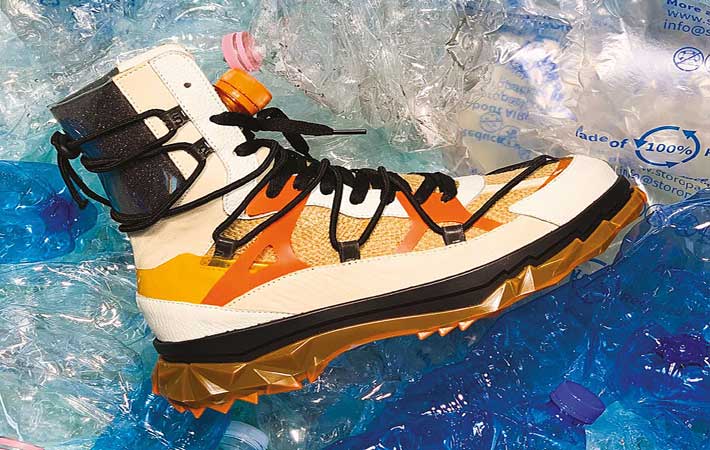
Future-oriented footwear materials are inconceivable without sustainability. Sustainability is a main pillar of BASF’s strategy and an integral part of all business decisions. That is why BASF invests around two billion a year in research and development and drives the development of new products that make a significant contribution to sustainability. BASF’s approach to a circular economy in footwear consists of three fields of action; Reduce, Recycle, Rethink. At the show, BASF experts will give a deep insight into this approach and present sustainable material solutions for polyurethane systems and thermoplastic polyurethanes, the company said in a media statement.
The main goal of BASF is to reduce the consumption of fossil resources and CO2 emissions. Elastopan N (PU systems) and Elastollan N (TPU) contribute to this, as they are partly based on renewable raw materials such as sugar, corn or castor oil. These bio-based plastic solutions are available in various densities and degrees of hardness and are suitable for all applications in the footwear sector.
In addition, BASF’s integrated production system enables the substitution of fossil by renewable feedstock derived from bio-waste. This concept, called the BASF biomass balance approach, can be compared to green electricity: When alternative energy sources (for example, wind and solar energy) are fed into the power grid, the output of the end product, electricity, remains unchanged. Similarly, at BASF, the biobased or recycled raw materials are fed into the production network at the beginning and then further processed in many steps, for example, into plastics. The principle offers the advantage that greenhouse gas emissions are reduced, and fossil raw materials are saved, while product quality and properties remain the same. For customers in the footwear industry, this also means that the product design and the processing for shoes do not have to be adapted. The concept can be applied to BASF’s complete range of PU systems, TPU and E-TPU for footwear, according to BASF.
To achieve the ultimate goal of a circular economy, it is important to rethink the production and use of footwear in general. This is the task that Italian designer Linda Lipari, together with designer Pierpaolo Righetto and students from Calzaturiero Politecnico (the School of Footwear Design and Technology) dedicated themselves to during the recent design competition, namely ‘design in the sign of sustainability’. The basis for the students’ various creative interpretations is the designers’ “RE2.0” sole design. RE implies Restart, Rethink, Recreate, Reconquer the world. The students’ unique shoe creations, combinations of design, performance, and sustainability, will be presented at the BASF booth.
Furthermore, BASF will present innovative coatings technologies for highly flexible substrates from our Coatings division. These solutions protect, functionalise, and colour flexible surfaces. They set new standards in design opportunities, individualisation and enable BASF’s customers to optimise their processes.
From 3D printed moulds and tools to completely 3D printed shoes, Additive Manufacturing can be a real game changer for the footwear industry. At Simac 2021, BASF 3D Printing Solutions, with its brand Forward AM, will present 3D printed moulds and lasts through which development cycles can be shortened tremendously. On top of this, visitors will see completely 3D printed high heels and barefoot shoes as well as midsoles manufactured with latticed designs which enable new ways of cushioning, shock absorption and comfort and which can be tuned to the customer’s specific needs. Lattice designs can be challenging for traditional manufacturing methods but are easy to produce in Additive Manufacturing. So, they perfectly showcase how 3D printing supplements traditional manufacturing methods and how customers benefit from BASF’s cross-technology solutions. This will also be highlighted by a new solution for the shoe industry, presented for the first time at Simac, which combines 3D printing with Infinergy material.
Fibre2Fashion News Desk (GK)